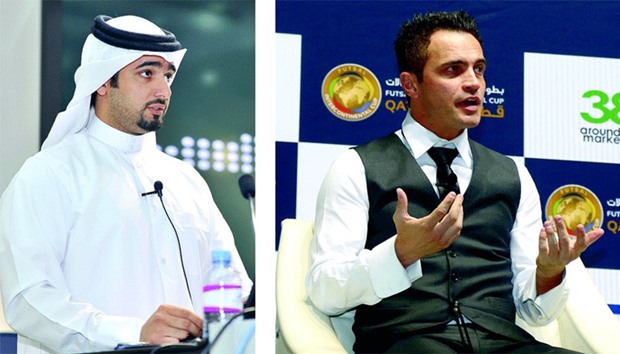
The groups are displayed after the draw ceremony.
The tournament brings together eight of the world’s best futsal teams who will battle it out for the winners’ trophy at two venues in Qatar — the Aspire Ladies Sports Hall and the Ali bin Hamad al-Attiyah Arena.
The inaugural edition of the tournament was held at Porto Alegre in Brazil in 1997 when Sport Club Internacional of Brazil won the title beating FC Barcelona 4-2 in the final.
The last edition of the tournament took place in 2013 and was won by Russian club Dynamo Moscow FC after they beat Brazilian club Carlos Barbosa 5-1.
Qatar will be represented by Al Rayyan, while the other teams in the fray are Spanish futsal league champions Inter Movistar, FC Barcelona Lassa, Brazilian giants Carlos Barbosa, Libertadores Cup winners Magnus Futsal, Asian champions Tasisat Daryaei of Iran, Dynamo Moscow of Russia and Portuguese champions Benfica.
“Hosting this tournament for the first time in Doha demonstrates the Qatar Football Association’s mission to be a pioneer football association in the region by organising local, regional and international football championships that contribute directly to the development of football, in this case more particularly the development of futsal,” QFA general secretary Mansoor al-Ansari said at the draw held at Aspire yesterday.
“We have the honour of organising this tournament in Doha for the next five years and it showcases our strong commitment to not only develop but also to positively impact futsal in the three continents, Asia, Europe and South America, notably by bringing together prestigious teams from all three continents,” he added.
Al-Mansoori said the tournament is a great opportunity for Qatar to showcase its excellent facilities besides its organisational abilities.
“We are proud to present the teams with state-of-the-art facilities which will encourage them to display their best performance when aiming to win this tournament. The Qatar Football Association will spare no effort to ensure that this event is organised to the highest of standards and has allocated Aspire’s Ladies Sports Hall as well as the recently opened Ali bin Hamad al-Attiyah Arena in Al Sadd.”
Javier Lozano, the president of LNFS (National Futsal League of Spain), who are collaborating with Qatar to organise the tournament, said the event will turn out to be the best in history.
“This is a tournament we feel very proud about because it will be a model of exemplary organisation never before seen in the history of futsal,” Lozano said.
“The tournament will be a turning point as far as futsal is concerned because it’s the first time it will be held in Asia,” he added.
One of the main attractions of the event will be the presence of Brazilian great Falcao (Alessandro Rosa Vieira), widely considered the best futsal player in the world.
Falcao, who has been named the ambassador for the event, has won several titles with his national team as well as for various clubs around the world as a professional.
“Qatar are the hosts of the FIFA World Cup in 2022 and it is a great honour for me to be named as the ambassador for the Intercontinental Cup,” he said.
“I would like to thank the QFA for organising this tremendous event which will showcase some of the best teams in the world,” Falcao, who helped Brazil win the Futsal world Cup in 2008 and 2012. In 2004 and 2012, he was also declared the best futsal player by FIFA.
All about Futsal
Futsal is a variant of football but is played on a smaller field and mainly indoors. Futsal is played between two teams of five players each, one of whom is the goalkeeper. Unlimited substitutions are permitted. The game is played on a hard court surface delimited by lines; walls or boards are not used. Futsal is also played with a smaller ball with less bounce than a regular football due to the surface of the field. The surface, ball and rules create an emphasis on improvisation, creativity and technique as well as ball control and passing in small spaces.
Futsal comes from Spanish fútbol sala or fútbol de salón , which can be translated as “room football”. During the sport’s second world championships held in Madrid in 1985, the Spanish name fútbol sala was used. Since then, all other names have been officially and internationally changed to futsal.
There are two periods of 20 minutes with time stopping at every dead ball. Between the two periods there is a break of 15 minutes. Each team may use one time-out per half, which lasts one minute. Some lower leagues and tournaments use 24 minute periods with running time.

